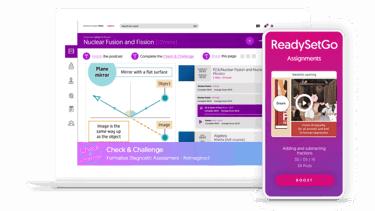Elizabeth Woodville School
Elizabeth Woodville school is an inclusive comprehensive school with approximately 1100 students.

Case study
Elizabeth Woodville School science teacher Dennis Chikobvu is so impressed with GCSEPod he’s including it in his PhD looking at blended learning in secondary education – a unique piece of research sparked by the global Covid pandemic and the rapid move to virtual teaching.
Dennis Chikobvu started out on his teaching journey in 2002.
Much has changed over the intervening 19 years – not least the influx of new technology.
Until this summer, Dennis admits he was only vaguely aware of GCSEPod, which was launched in 2010 as a GCSE revision tool but has rapidly developed into a multi award-winning EdTech solution. The teaching, assessment, and revision platform boasts impressive content and an unrivalled array of student and teacher tools to reduce workload and it has become an integral part of GCSE/IGCSE delivery in hundreds of UK and international schools.
“GCSEPod has been an excellent tool to set homework for our GCSE students over the summer break. GCSEPod gave us feedback on individual questions, where students scored low marks ; GCSEPod recommended booster sessions.
It also provided a mark-book so that as teachers, we can track and monitor class and individual progress. It’s reduced our workload and enabled us to work smarter.”
Before the summer holidays, the science teacher at the 1,200-strong Elizabeth Woodville School in Northampton, turned to GCSEPod to merely set holiday homework and prioritise revision but once he opened the door, he realised there was so much more than met the eye.
Dennis was very impressed by the ease of use; the high quality and appealing content; the way students can be targeted in specific areas to improve their understanding; the in-depth subject coverage; the tracking and monitoring of engagement; the ready-made assignments; the automatic marking of homework; the exam practice questions; and the way it fosters independent study.
There was also the time saving element. “It only takes a few seconds to set a whole class their work, and given I was doing this in my own time that was a great bonus,” he explains.
“It was easy to navigate but most importantly, it had everything I needed. I’ve been a teacher for many years so I know the sort of questions that are likely to be asked on the GCSE science papers.
“For example, I know that for chemistry Paper 1, there will always be a question on bonding, and for physics there will be a question on forces.
“The way GCSEPod is set up makes it easy to find the Pods and questions you need, so it was simple to set the work I wanted my students to do every week over the holidays.
“More than that, it was incredibly easy for me to track and monitor not only which students were engaging with the work, but their understanding of it as the marking is done for you and you get an alert if they haven’t grasped it, making it easier to intervene.
“It is the knowledge GCSEPod gives you of how well a subject has been understood or who may need extra help that I have found particularly useful. A student will now come up to me and say ‘Sir, I’ve done your questions,’ and I’ll say ‘yes, but I saw you struggled on question five about enzymes.’
“Or I’ll see another student around the school and because of the way GCSEPod works I will already know they got the question on cells wrong. So, I’ll direct them to the Pods on cells they need to look at. The teacher-student learning relationship has changed as I now know their weaknesses and their strengths, whether or not they have done their homework, or if they aren’t watching the videos and digesting the information and are instead just going straight to the questions.”
Just weeks after discovering GCSEPod, Dennis has been so impressed with the education-on-demand platform that he’s including it in a PhD he’s undertaking in conjunction with Coventry University looking at blended learning in secondary education.
The research which Dennis instigated in April this year around the time he joined the teaching team at Elizabeth Woodville, has been motivated by the Covid pandemic and the way UK schools had to adapt overnight in March 2020 to learning moving from the classroom to online.
He noted that most of the available research on blended learning was centred around universities with nothing having been done at a school level in the UK.
Dennis explains: “My research proposal looks at an evaluative model that compares online with face-to-face. What we find is that the two complement each other when used appropriately.
“I believe that is where the future of blended learning lies – students learning at their own pace and clarifying and consolidating that information in class using tools like GCSEPod.
“One of GCSEPod’s greatest strengths is the analytics and immediate feedback it provides. You don’t have to wait 24 hours for the results, it is immediate. Is it the magic bullet? That is one of the things I am wanting to find out.”
The research will take between four and six years with both qualitative and quantitative evidence required.
Dennis is embarrassed that it took him until this summer to discover GCSEPod, but in just this short period of time GCSEPod would seem to have positively transformed his students’ view of science and the culture surrounding it.
“When a student does their homework it is because they enjoy the subject. Now, when I put the homework up by the next day, they have all done it. When I put an optional extension up, again they all do it.
“I think that shows they are motivated and that they are enjoying not only science but using GCSEPod. Initially it was extrinsic motivation, now it is intrinsic.”
Dennis has rolled out GCSEPod across Years 8-11. With the Year 8’s he is keen to get them ready and used to working online. “If there should be another pandemic, all the evidence says that those that are already adapted to online learning and using a tool like GCSEPod are more suited to working that way.
Elizabeth Woodville’s Assistant Head and health and social care teacher, Ella Lloyd-Jones, who also takes the lead on GCSEPod, describes it as a “powerful” tool in catching students that can be hard to reach academically in other ways.
She likes the way GCSEPod is constantly evolving with new assignments and topics being added. GCSEPod isn’t used as a substitute for teaching, but says it comes into its own as a tool when helping to assess what students have learnt and understood, which can then be fed back into lesson planning.
Of Dennis’s research and enthusiasm for GCSEPod, Ella says: “It’s great. If we can learn something from it, can help push our student outcomes even further, develop our staff, move with the times and show people that things can be done in different ways that will make work easier rather than harder, then that has to be of benefit.
What could we help your school achieve?
Are you a high achieving school with record results, is your Progress 8 score currently below average, or maybe you somewhere in between? No matter what your current standing, all types of schools are finding huge GCSE learning and revision success using GCSEPod. Let us show you how GCSEPod could help reach your school goals.
